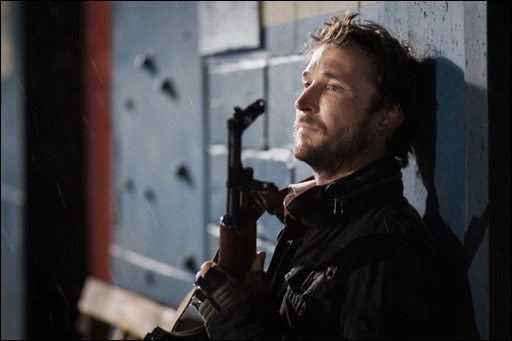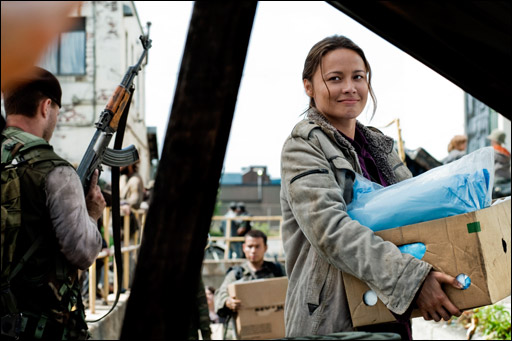"Falling Skies," the much talked about alien invasion TV series (probably because Steven Spielberg's name is in the production team), premieres on TNT next week, on Sunday, June 19. This happens just as ABC's "V" — the only remaining alien invasion series on a major network — has been cancelled, so we thought this would be a good time to take a closer look at those specific genre shows. After a quick peek at their evolution over the years, we will try and define "Falling Skies" place into the fray in a vain attempt to estimate its chances of success.
Contrary to what one might think, alien invasion TV series are not quite as common, or quite as old, as other sci-fi TV shows; but, similar to their older and more popular counterparts, they originally grew out of movies and novels. In 1898, one novel in particular not only introduced the concept, but also laid out the early blueprint of such stories: H.G. Wells's The War of the Worlds. The novel tells the story of a Martian invasion in England, during which a man tries to reunite with his wife. Movies were, as usual, the first to jump on the bandwagon, and it wasn't until 1967 — sixteen years after the first movies — that we had with ABC's The Invaders, the first alien invasion TV series produced in the US. The series ran for two seasons, but there was no other production in this sci-fi subcategory until the late 1980s. In 1988, the new series War of the Worlds extended the story of Wells's book (first adapted in a 1953 movie) by using the now cliché the-aliens-didn't-quite-die trick, but wasn't able to go beyond one season. During the following two decades, other U.S. productions all suffered similar fates, all suffering in ratings. Note the short length of their runs:
The Invaders (ABC, 1967-1968) tells the story of David Vincent, an architect who accidentally learns of an ongoing secret alien invasion and starts traveling from place to place to thwart the aliens' plots. In the series, aliens can disguise as humans and we have a one-man-against-the-world type of story.
Dark Skies (NBC, 1996-1997) is the story of a man and a woman in 1960s America who are trying to foil the plots of infiltrated aliens (the Hive) that are behind many of what we consider today as historical events. There is government conspiracy and, just like for The Invaders, the sense that the protagonists are alone in their plight.
First Wave (Sci-Fi, 1998-2001) tells the story of a man who has been experimented on by aliens (the Gua) and escaped captivity to try and stop the impending invasion. Again very similar to the preceding series.
Threshold (CBS, 2005-2006) is the story of the implementation of a contingency plan (code-named Threshold) in case of first contact with aliens. A sort of cross between Michael Crichton's Andromeda Strain and Sphere, with some unkind aliens behind the virus. The story — designed as a three-season arc — obviously had some promise, but was nonetheless cancelled before the end of the first season. This is a major break from what we have seen until now. No government cover-up or conspiracy, but in my opinion a rather realistic and refreshing approach to the whole concept.
V (ABC, 2009-2011) tells the story of an alien invasion by extraterrestrial "Visitors" who don't hide their spaceships and claim to come in peace, but seem to have hidden agendas. The visitors are reptilian under their human body-suits. The story takes us back to earlier themes of the genre. The cancelled series was actually the latest production of a franchise that includes two miniseries and an original series, all produced in the 1980s.
With the exception of Threshold, the series above are not much different from each other and deal with very similar themes. Infiltration seems to be the norm with only a few people aware of the aliens presence and of their scheming. Government is typically useless or is co-conspiring. Only Threshold has an all-out alien attack with government (read the whole world) organizing to fight back, but that didn't save the show from cancellation because of rating troubles — just like the others.
TNT's Falling Skies is more similar to Threshold as it opens with the alien invasion all but complete, making words like "resistance" very appropriate when describing the actions of the remaining human population. The series follows a group of survivors led by Tom Mason, a history professor played by Noah Wyle, who, amidst the turmoil, is trying to protect his three sons and keep his family together. From the preview, the show seems to get the atmosphere right with a realistic approach to cities' destructions and to the ensuing challenges for survivors. Previous alien invasion TV series — aside from Threshold — all had an issue with long-term sustainability, because one can only maintain the threat of invasion for so long. Falling Skies is, in part, avoiding that by setting the story after the invasion. The series has also set itself up to be very much about family in spite of the bleak setting, utilizing a reliable television trope. Finally, there are the dynamics of the relationships between the history professor and other, more military-minded leaders of the resistance. Will the show succeed in grabbing viewers with those storylines, and fend off the unavoidable alien-fatigue by making us consider the invaders as mere thrilling plot devices? Only time will tell. But, it sure looks as if it has better chances than its forerunners.